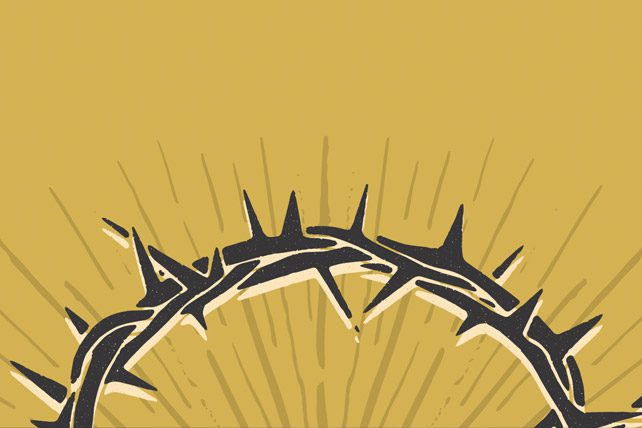4 Reasons Why Good Friday Service Should Not Be a Funeral for Jesus
By Dale Chamberlain – April 4, 2022 (www.churchleaders.com)
Holy Week is an incredibly important week on the Christian calendar. It’s the week when we celebrate the most central events and truths of our faith.
This week, we celebrate the last week of Jesus’ earthly ministry: his entrance into Jerusalem, the last supper, his betrayal, death, and resurrection.
This Friday, your church may have a Good Friday service, where we remember Jesus’ death on the cross. I once heard someone jokingly ask, “Why do we call it Good Friday? It doesn’t seem like it was a very good day for Jesus.” And that seems like a good point. The day Jesus was crucified was a rough day (understatement of the century, I know).
Because of the heaviness of the day, we can have the tendency to treat Good Friday service as though it were Jesus’ funeral. But I think that misses something of the goodness of Good Friday. There is a deep and rich goodness that I think God wants us to celebrate.
Here are four reasons why Good Friday service shouldn’t be a funeral service for Jesus.
1. Jesus’ Death Was a Victory of Obedience.
We’re cut to the heart when we read of Jesus’ words from the cross: “My God, my God, why have you forsaken me?”
As we hear Jesus’ words of pain, we get a glimpse into the suffering that he experienced as he hung on the cross for you and me. This is not something that we should ever brush past or take lightly.
But what was happening in that moment?
Was Jesus God Forsaken?
It’s a great tragedy that we have not properly understood Jesus’ words in their context. Many theologians have tried to imagine this moment. And they have explained that Jesus was completely separated from the Heavenly Father.
According to these theologians, in this moment, the connection that had existed between the Heavenly Father and the Son from eternity past was completely severed. So when Jesus asks why God has forsaken him, it is because he feels the weight of eternal separation from divinity in that moment on the cross.
But what if we’re misreading that moment? What if Jesus is saying something different?
A Psalm of Victory
When Jesus cried out to God, he was actually quoting a psalm from the Old Testament. Psalm 22, which was written by King David, begins with the very same words: “My God, my God, why have you forsaken me?” The song is a lament. It’s a song that cries out to God in pain.
And as Jesus hung on the cross, he saw this psalm playing out before his eyes. The song speaks about his enemies mocking him, wagging their fingers at him, gloating over him, and encompassing him. Jesus could relate as he looked around at the religious leaders who mocked him from the foot of the cross.
But the song that Jesus was quoting didn’t end on a down note. The song acknowledges the deep pain and inner turmoil that is brought about by betrayal and injustice. But then the song takes a turn. The singer remembers that God is still good. His promises are still true. There is still hope.
Here are the final verses of Psalm 22.
From you comes my praise in the great congregation; my vows I will perform before those who fear him. The afflicted shall eat and be satisfied; those who seek him shall praise the Lord! May your hearts live forever!
All the ends of the earth shall remember and turn to the Lord, and all the families of the nations shall worship before you. For kingship belongs to the Lord, and he rules over the nations.
All the prosperous of the earth eat and worship; before him shall bow all who go down to the dust, even the one who could not keep himself alive. Posterity shall serve him; it shall be told of the Lord to the coming generation; they shall come and proclaim his righteousness to a people yet unborn, that he has done it.
A Cry of Strength
Did you catch the last line of that psalm? We shall proclaim to generation after generation that God has done it.
What were Jesus’ final words on the cross? “It is finished.”
And when Jesus surrendered his spirit, he did not die with a whimper. He yielded his spirit with a loud voice—a shout of strength.
Jesus’ death was tragic. But it was not his defeat. It was his greatest moment of obedience. It was the moment that Satan lost forever.
This is why it was at the moment of Jesus’ death that the veil of the temple was torn from top to bottom. By Jesus’ victory of obedience, the presence of God went out from the temple to his people.
2. Jesus’ Death Was Once for All.
When we celebrate Good Friday, we remember that Jesus died once for all. And that means that we don’t need to crucify him again every year.
This also means that we don’t need to subject ourselves to multiple viewings of “The Passion of the Christ,” or to gory descriptions about the horrors of crucifixion.
While these things may have their place, and many of the details that we can pull together are absolutely true, I think there’s an intentional purpose to the fact that none of the four crucifixion narratives in the bible go into graphic detail about the physical suffering Jesus went through.
The point of the crucifixion story isn’t the scandal and indignity of Jesus’ physical suffering—though it was excruciating (a word with a Latin root that literally means out of the cross). Nothing happened to Jesus that he was not in control of.
The point is that Jesus was making a once for all sacrifice for you and me. And his sacrifice is completed. The work is finished.
But when Christ had offered for all time a single sacrifice for sins, he sat down at the right hand of God, waiting from that time until his enemies should be made a footstool for his feet. (Hebrews 10:12-13)
3. Jesus’ Death Was an Act of Love.
The crucifixion story is about an act of love. It was an act of love for you and me.
The details that do stand out in the crucifixion narratives are all the ways that Jesus loved other people, even in the darkest moments of his earthly life.
When Jesus looked at the people who were doing these horrible things to him, he prayed for their forgiveness, because they didn’t understand what they were doing.
When Jesus hung next to a criminal on a cross near him (a man who actually deserved it), Jesus promised him paradise because of his faith.
When Jesus looked at his mother and his friend, John, he encouraged their hearts by entrusting the care of his mother to John.
And when his act of love was completed, he commended his spirit into the hands of the Father. This is what we remember on Good Friday: the ultimate act of love.
4. Jesus Didn’t Die so That We Would Feel Guilty.
The point of Good Friday service isn’t that we would come to church, simply feeling the weight of our guilt and shame, so that we can be cleaned of it until next year’s Good Friday.
Jesus has already felt the weight of your sin and shame.
By his sacrifice, Jesus has paid the penalty. He has reconciled us back to God. We no longer exist in a relationship with God defined by guilt and shame. We operate in a relationship full of safety and love.
Do we still sin? Yes. Do we still need to confess? Absolutely. Do we still need to continually cleanse our hearts and seek after the good that Jesus is calling us into? May it be the calling of our lives.
The point of Good Friday is that now we have the means to actually draw near to God. And we can draw near to God with confidence. This is the relationship that Jesus has made possible for us.
Jesus Gave His Life so That We Might Experience Abundant Life.
The point of Good Friday isn’t death. The point of Good Friday is life. Jesus gave his life, so that you and I could have life. He gave his life so that we could experience an abundant kind of life.
So Good Friday isn’t a funeral service. It’s a celebration of everything that Jesus has done for us. It’s a rallying point of our greatest victory. Even in death, Satan could not win. Jesus experienced victory in his death, and so will we.
Death has lost its sting. Everything has been swallowed up in victory.
![]() Dale Chamberlain (M.Div) is the Content Manager for ChurchLeaders.com. He is also a blogger and podcaster who is passionate about helping people tackle ancient truths in everyday settings. He lives in Southern California with his wife Tamara and their two sons.
Dale Chamberlain (M.Div) is the Content Manager for ChurchLeaders.com. He is also a blogger and podcaster who is passionate about helping people tackle ancient truths in everyday settings. He lives in Southern California with his wife Tamara and their two sons.

